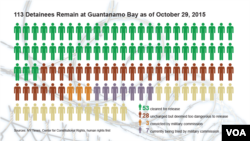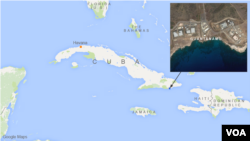President Barack Obama's quest to close the prison at Guantanamo Bay, perhaps by moving some detainees to the United States, has sparked an unusual alliance between his congressional critics and liberal-leaning advocacy groups that say changing the detention facility's ZIP code won't solve the problem.
Groups like Amnesty International and the American Civil Liberties Union argue that moving the terror suspects to U.S. soil doesn't end the policy of indefinite detention.
Republican lawmakers who want the detainees to stay at Guantanamo Bay, Cuba, agree. They argue that extremists will use the detention without charge as a recruiting tool whether the terror suspects are in Cuba or at a U.S. prison some have dubbed "Gitmo North."
Seven sites
A Defense Department team recently finished surveying seven sites in Colorado, South Carolina and Kansas that could be the next address for some of the 112 detainees currently housed at Guantanamo Bay.
The White House is expected to release a report soon assessing the feasibility of using the U.S. Disciplinary Barracks and Midwest Joint Regional Corrections Facility at Leavenworth, Kansas; the Consolidated Naval Brig, in Hanahan, South Carolina; the Federal Correctional Complex, which includes the medium, maximum and supermax facilities in Florence, Colorado; and the Colorado State Penitentiary II in Canon City, Colorado, also known as the Centennial Correctional Facility.
"If somebody is housed indefinitely in Hanahan, South Carolina, versus Guantanamo Bay, they are still housed indefinitely without charges brought against them," said Rep. Mark Sanford, a conservative Republican from South Carolina who wants to keep the detainees at Guantanamo.
His comments echo those who have long wanted to see the prison closed.
Tina Foster, a New York lawyer who represents Guantanamo Bay detainees, said closing the prison is nothing more than a public relations measure.
"It does absolutely nothing to address the continued detention of men who have now been detained for 15 years without trial," she said. "The real danger posed by bringing detainees to U.S. soil is that it opens the door to indefinite detention without trial on U.S. soil."
Criminal justice system
That also worries Naureen Shah at the Amnesty International's U.S. section. She said moving prisoners, detained without charge, to the U.S. sets a dangerous precedent and makes a mockery of the American criminal justice system.
She also worries that future presidents could detain more terror suspects in coming conflicts, resulting in a parallel justice system in the United States -- one where some people can exercise their U.S. right to a fair trial and others who can be held indefinitely without charge.
"Nobody should be locked up to die without charge," she said, noting that Amnesty International wrote a six-page letter to Obama last month, urging him not to move detainees to the United States.
Chris Anders, senior legislative counsel at the American Civil Liberties Union in Washington, said, "The problem with Gitmo is not just the prison or the real estate, it's the policy of indefinite detention without charge or trial."
Obama has tried repeatedly over the years to close the prison, but Republicans and some Democrats in Congress have resisted. In the meantime, the administration has transferred prisoners overseas, reducing the population from 242 when Obama took office to 112. That's down from a high of nearly 800.






